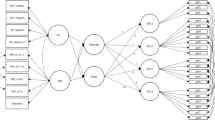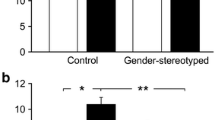Abstract
The relationship between personality variables associated with sex roles and the cognitive variables of math and verbal ability was examined in three groups of adolescents. Masculinity and femininity of interests, behavioral traits, and values were examined using three inventories: the Femininity Scale from the California Psychological Inventory, the Bem Sex Role Inventory, and the Study of Values. Results indicate that there is some evidence for a positive relationship between masculine traits and values and math ability, and feminine traits and values and verbal skills (for both sexes). Certain traits indicative of maturity were found to be positively related to both high math and high verbal scores, while certain highly sex-typed traits and interests were found to be negatively related to both cognitive variables. A different relationship for males and females was found between high intellectual scores and indicators of self-concept and emotional well-being. The differing relationship between each of the three personality variables indicative of sex roles (e.g., interests, values, traits) and cognitive variables emphasizes the need to view masculinity and feminity, as well as “sex-role,” as a complex combination of the many different aspects of sex roles as they exist in our society.
Similar content being viewed by others
References
Aiken, L. R., Jr. (1976). Update on attitudes and other affective variables in learning mathematics.Rev. Educ. Res. 46: 293–311.
Allport, G. W., Vernon, P. E., and Lindzey, G. (1970).Manual for the Study of Values: A Scale for Measuring the Dominant Interests in Personality, Houghton-Mifflin, Boston.
Anastasi, A. (1958).Differential Psychology: Individual and Group Differences in Behavior, Macmillan, New York.
Astin, H. S. (1974). Sex differences in mathematical and scientific precocity. In Stanley, J. C., Keating, D. P., and Fox, L. H. (eds.),Mathematical Talent: Discovery, Description and Development. The Johns Hopkins University Press, Baltimore, pp. 70–86.
Bem, S. (1974). The measurement of psychological androgyny.J. Consult. Clin. Psychol. 42: 155–162.
Bem, S. L., and Lenney, E. (1976). Sex-typing and the avoidance of cross-sex behavior.J. Personal. Soc. Psychol. 33: 48–54.
Bernard, J. (1974). Sex differences: An overview.MSS Modular Publicat. Module 26, pp. 1–18.
Bieri, J. (1960). Parental identification, acceptance of authority, and within-sex differences in cognitive behavior.J. Abnorm. Soc. Psychol. 60: 76–79.
Bing, E. (1963). Effect of childrearing practices on development of differential cognitive abilities.Child. Dev. 34: 631–648.
Block, J. W. (1973). Conceptions of sex-role: Some cross-cultural and longitudinal perspectives.Am. Psychologist 28: 512–526.
Bohannon, W. E., and Mills, C. J. (1979). Psychometric properties and underlying assumptions of two measures of masculinity/femininity.Psychol. Rep. 44: 431–450.
Bruning, J. L. and Kintz, B. L. (1968).Computational Handbook of Statistics, Scott, Foresman, Glenview, Ill.
Coffman, R. N., and Levy, B. I. (1972). The dimensions implicit in psychological masculinity-femininity.Educ. Psychol. Meas. 32: 975–985.
Constantinople, A. (1973). Masculinity-femininity: An exception to a famous dictum.Psychol. Bull. 80: 389–407.
Cooley, W. W., and Lohnes, P. R. (1971).Multivariate Data Analysis, Wiley, New York.
Dwyer, C. A. (1974). Influence of children's sex role standards on reading and arithmetic achievement.J. Educ. Psychol. 66: 811–816.
Fennema, E., and Sherman, J. (1977). Sex-related differences in mathematics achievement, spatial visualization and affective factors.Am. Educt. Res. J. 14: 51–71.
Fennema, E., and Sherman, J. (1978). Sex-related differences in mathematics achievement and related factors: A further study.J. Res. Math. Educ. 9: 189–203.
Ferguson, O. R., and Maccoby, E. (1977). Interpersonal correlates of differential abilities.Child. Dev. 37: 549–571.
Gleser, L. J. (1972). On the bounds for the average correlation between subtest scores in ipsatively scored tests.Educ. Psychol. Meas. 32: 759–766.
Gough, H. G. (1952). Identifying psychological femininity.Educ. Psychol. Meas. 12: 427–439.
Haier, R. J., and Denham, S. A. (1976). A summary profile of the nonintellectual correlates of mathematical precocity in boys and girls. In Keating, D. P. (ed.),Intellectual Talent: Research and Development, The Johns Hopkins University Press, Baltimore, pp. 225–241.
Hall, J. S., and Halberstadt, A. G. (1980). Masculinity and femininity in children: Development of the Children's Personal Attributes Questionnaire.Dev. Psychol. 16: 270–280.
Hammer, E. F. (1964). Creativity and feminine ingredients in young male artists.Percept. Mot. Skills 19: 414.
Hoffman, L. W. (1972). Early childhood experiences and women's achievement motives.J. Soc. Iss. 28: 129–155.
Keating, D. P. (ed.) (1976).Intellectual Talent: Research and Development, The Johns Hopkins University Press, Baltimore.
Maccoby, E. E. (1966). Sex differences in intellectual functioning. In Maccoby, E. E. (ed.),The Development of Sex Differences, Stanford University Press, Stanford, Calif.
Maccoby, E. E., and Jacklin, C. (1974).The Psychology of Sex Differences, Stanford University Press, Stanford, Calif.
Milton, G. A. (1957). The effects of sex-role identification upon problem-solving skill.J. Abnorm. Soc. Psychol. 55: 208–212.
Mokros, J., Taylor, R., and O'Neill, M. (1977). Adolescents' perceptions of the causes and consequences of success in sex-linked occupations.Sex Roles 3: 353–364.
Nie, N. W., Hull, C. N., Jenkins, J. G., Steinbrenner, K., and Bent, D. H. (1975).Statistical Package for the Social Sciences, McGraw-Hill, New York.
Sherman, J. A. (1978).Sex-Related Cognitive Differences: An Essay on Theory and Evidence, Thomas, Springfield, Ill.
Spence, J. T. (1977). Traits, roles and the concept of androgyny. Talk given at the Conference on Perspectives on the Psychology of Women, Michigan State University, East Lansing, May.
Spence, J. T., Helmreich, R., and Stapp, J. (1975). Ratings of self and peers on sex-role attributes and their relation to self-esteem and conceptions of masculinity and femininity.J. Personal. Soc. Psychol. 32: 29–39.
Stanley, J. C., Keating, D. P., and Fox, L. H. (eds.) (1974).Mathematical Talent: Discovery, Description and Development, The Johns Hopkins University Press, Baltimore.
Stein, A. H., and Bailey, M. M. (1973). The socialization of achievement orientation in families.Psychol. Bull. 80: 345–366.
Terman, L. M., and Miles, C. C. (1936).Sex and Personality, McGraw-Hill, New York.
Walberg, H. J. (1969). Physics, femininity, and creativity.Dev. Psychol. 1: 47–54.
Welsh, G. S., and Baucom, D. H. (1977). Sex, masculinity-feminity, and intelligence.Intelligence 1: 218–233.
Author information
Authors and Affiliations
Additional information
This article is based on a doctoral dissertation submitted to the Department of Psychology, The Johns Hopkins University.
Received Ph.D. in psychology from Johns Hopkins University. Main research interests are gifted adolescents, sex-role development, and personality development.
Rights and permissions
About this article
Cite this article
Mills, C.J. Sex roles, personality, and intellectual abilities in adolescents. J Youth Adolescence 10, 85–112 (1981). https://doi.org/10.1007/BF02091739
Received:
Issue Date:
DOI: https://doi.org/10.1007/BF02091739




